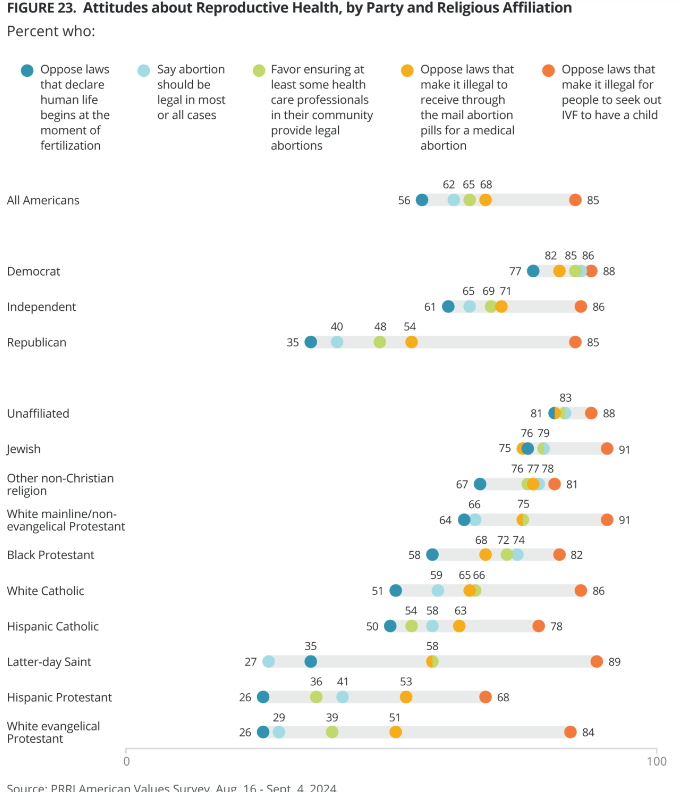Focusing on American attitudes about gender and gender roles reveals more about the 2024 election than simply tracking the sex of voters, said Melissa Deckman, CEO of Public Religion Research Institute.
“That is far more important to understanding American politics,” Deckman said during an Oct. 16 webinar release of the 2024 American Values Survey conducted by PRRI in partnership with the Brookings Institution. “I’ve never run across an election in memory where gender themes have played such a prominent role as this year.”
The new study, “Challenges to Democracy: The 2024 Election in Focus,” delves into American beliefs about gender, sexuality, abortion, political violence and other issues voters identified as critical to their choices in the ballot box.

Melissa Deckman
During the webinar moderated by Brookings Senior Fellow William A. Galston, Deckman and fellow culture and politics experts Joy Reid, A.B. Stoddard and Robert P. Jones discussed survey findings they considered most revealing, disconcerting and shocking in the final weeks leading up to Election Day.
Deckman said the Trump campaign has staked out aggressively patriarchal positions on reproductive health and other causes that have contributed to a widening of the longtime political gap between men and women.
“Since 1996, American women have tended to back Democratic presidents by a majority vote and men have tended to back Republican candidates. In 2020, men broke for Trump 53% compared to 45% for Biden, while Biden’s advantage to women was 55% to 44%.”
But a recent CBS News/Ipsos poll found the gap has widened in recent months, with Democratic presidential candidate Kamala Harris leading by 13 points among women, 54% to 41%, and Trump leading with men by 5 points, 51% to 46%.
Several recent Trump statements and moves have helped widen that gulf, Deckman explained, including his selection of Ultimate Fighting Championships CEO Dana White to introduce him at the Republican National Convention in July. Choosing a self-proclaimed tough guy over a noted politician or family member spoke volumes to Trump’s base — and to women.
And White delivered. “This man is the toughest, most resilient human being that I’ve ever met in my life, and I’m in the tough man business,” White said before Trump accepted the Republican nomination in Milwaukee.
Picking JD Vance as his running mate confirmed Trump’s embrace of a more traditional and patriarchal form of gender bias, Deckman said.
“I think we’re all very familiar with his comments made to Tucker Carlson, when he was running for Senate (in 2021), about the threat posed by ‘childless cat ladies’ to America,” she said of Vance. “But he singled out childless Democratic leaders such as Kamala Harris by name, basically saying how does it make any sense that we have turned our country over to people who don’t really have a direct stake in it.”
Vance has gone further to suggest Americans with children should have more rights than those without children, she added. “It’s a very pro-natalist sort of view of America, which I think may have some serious policy implications for America’s women if there is a second Trump administration, given that we are in a post-Dobbs landscape.”
“Only 20% of Democratic men agree that America has become too soft and feminine, while more than two-thirds of Republican women agree that America has become too soft and feminine.”
She also pointed to Vance’s connection to Project 2025, the Christian nationalist blueprint for establishing a theocratic nation, calling for a national abortion ban, banning emergency contraception and threatening in vitro fertilization by declaring the personhood of fetuses.
The widening political gap between men and women also may be found in a question PRRI has been asking Americans for more than a decade: Has the nation become “too soft and feminine?”
In 2011, 42% answered yes, and 43% did so in the most recent survey, Deckman noted. “But if you look at the gender break within that question, we find about half of American men agree with that compared to 38% of American women.”
Large divides also were found along partisan lines, with three-quarters of Republicans agreeing the nation is too soft and feminine compared to 42% of independents and 16% of Democrats who share that view. Almost two-thirds of white evangelicals and 58% of Latter-day Saints affirmed the question, compared to 36% of Hispanic Catholics and 25% of Black Protestants.
“I think this is really notable: Only 20% of Democratic men agree that America has become too soft and feminine, while more than two-thirds of Republican women agree that America has become too soft and feminine. And with GOP men, it’s eight in 10 who agree that America has become too soft and feminine,” Deckman said.
PRRI also reported that 80% of Americans who believe the country is too soft and feminine plan to vote for Trump, and 77% of those who disagree with the statement plan to vote for Harris.
But it is young women Republicans should be worried about, said Deckman, author of The Politics of Gen Z: How the Youngest Voters Will Shape Our Democracy. “They are far more likely to identify as feminists than their mothers and their grandmothers, and gender equality has become a huge theme among young women.”
As a result, Trump’s antics such as pronouncing himself the “protector” of women will not endear him to a demographic proven to show up at the polls, she said. “The talk that we hear from Trump actually will animate younger women to turn out in higher numbers this election cycle.”

Related articles:
79% of Republicans favor rounding up illegal immigrants into camps before deportation
Trump supporters still favor political violence and election denial, survey says


